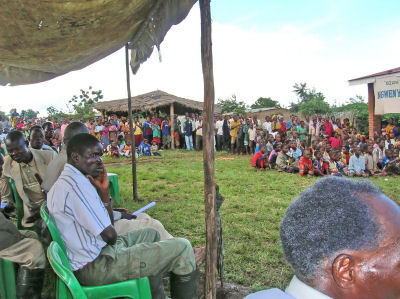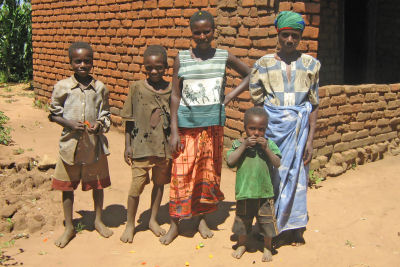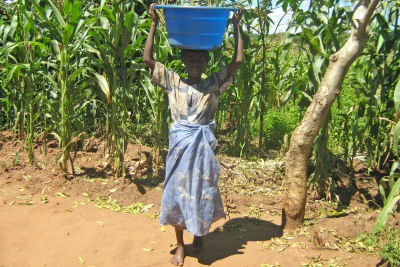Charity working with communities
23/06/2008

Report from June 2008
The SOS Social Centre in Lilongwe and surrounding villages focuses on the following interventions: Food Security, Education Support, Community Home Based Care (CHBC), HIV/AIDS Prevention and Advocacy, Water and Sanitation, and Training & Capacity Building. Currently, 2,000 children benefit from this programme (1,118 boys and 882 girls), as do 842 adults (309 men and 533 women).
In Malawi, the traditional forum for discussing village matters is through a gathering of the elders of the village, and this traditional structure has been adapted by the SOS Social Centres to ensure that the correct support gets to the correct members of the community. Village Development Committees (VDCs) have been set up in 12 villages around Lilongwe; as well as members discussing what the most urgent issues are in their villages, and who the neediest beneficiaries are, they work together to ensure the programmes supported through SOS Children are having a positive impact and that they continue to address the relevant issues. VDCs ensure sustainability and longevity of development programmes in these villages. Our programmes are also more likely to be accepted by communities if those communities have a say in how these programmes will be run.
Education

109 secondary school students were supported in various secondary schools, 44 tertiary students supported at the
Vocational Training Centre (VTC), and six are supported through colleges or university. 1,177 Social Centre supported primary school students have been enrolled in various schools around CDC catchment area.
Secondary, Tertiary and Primary school students are supported with school fees, education materials and some including clothes, boarding fees and pocket money. This has improved the performance of children at their respective schools.
76 community members went on a study tour for livestock and food security programmes. The objective was to build the capacity of families, Village Development Committees (VDCs), Chiefs and partners to effectively respond to food security and livestock programmes.
A Social Mobilization Campaign on Education (Go Back to School Campaign) was conducted in our impact area. A total number of 35 pupils were re-enrolled into primary schools and 5 into secondary school.
Food and agriculture
A total of 370 families were provided with maize seed and fertilizer, and farm trainings were carried out to ensure increased access to food. Twelve communal gardens were supported with farm inputs. This has reduced the food deficit gap. 40 pallets for the community maize were bought.
Treatment of rooms for storing maize from the community was done to ensure termites and pests were destroyed. Sixty families were supported with chicks for poultry farming. 692 bags of maize were paid back by the community as loan recovery for food security.
Health and nutrition

A total of 205 Community Home based care patients have been provided with treatment and nutritional supplement such as vita meal. An average of 324 caregivers were supported with medical care through outreach clinics, which were conducted every fortnight.
A total of 205 beneficiaries were provided with counselling, who in turn provide counselling to vulnerable children in the area. 110 HIV clients were referred for Ante-retro viral (ARV) Therapy.
In an effort to access safe water and sanitation a borehole was sunk at Santhe Village which will benefit more than 250 families. Training of water point committees on Community Based Management on water and sanitation issues was conducted. Participants were also trained on how to maintain the boreholes to ensure continued access to safe drinking water. A total number 65 dome slabs were caste to improve sanitation and hygiene practices. The incidence of water-born diseases has reduced since most people are drinking safe water and practice hygiene sanitation.
A total of 556 (318 men & 238 women) people were tested during the Advocacy Campaign on HIV/AIDS Testing and Counselling (HCT) week. 515 people tested negative and 41 positive. Most communities in our impact are now able to make informed decisions.
Partners
We managed to strengthen the network of partners in the operating area and at district level. These partners are as follows: Ministry of Health, Ministry of Gender and Child Development, Ministry of Water, Social Welfare Department, House of Hope, Paradizo Home Based care and other government departments and ministries. This was done to ensure sustainability of the Family Strengthening Programme activities since we are complementing government efforts.
Relevant Countries: Malawi.